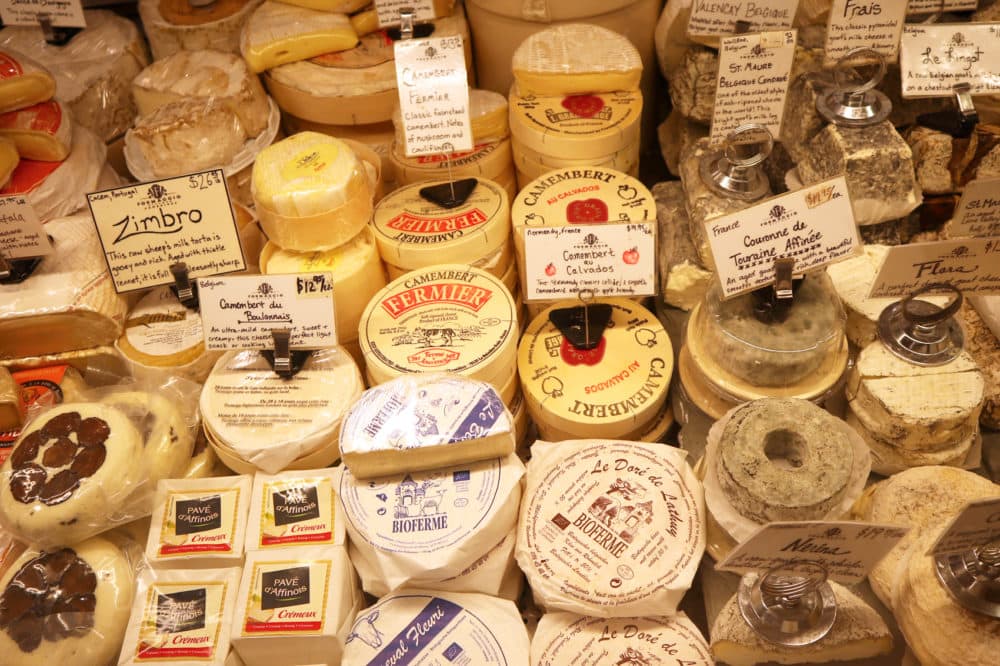Advertisement
For Local Cheese Sellers, New Trump Tariffs Are A Wedge Issue

The Trump administration is threatening to impose a 25% tariff on a variety of goods imported from the European Union, after the World Trade Organization determined that the E.U. was unfairly subsidizing its aircraft industry. Those goods include German knives, French wine and Scotch whisky — and cheese.
That’s bad news for Ihsan Gurdal, co-owner of Formaggio Kitchen, a specialty food shop in Cambridge. Inside the store, you can almost see the tariff list come to life: Shelves are stacked with European wines, bins brim with olives, and wheel upon wheel of cheese hails from Italy, the U.K., Switzerland and more.
“My staff is asking me to write letters to our overseas producers saying, ‘Can you give us a break?’" Gurdal said, because of the way the tariffs will increase costs.
Gurdal estimates that cheese is about one third of his business, and the vast majority of the cheese he sells comes from Europe. The Trump administration says the new tariffs will take effect on Oct. 18, which Gurdal called "the worst possible timing" for his business.
Between holiday get-togethers and gift baskets, Gurdal said the next few months are his company's “bread and butter season.”
"Everything kind of magnifies" in November and December, he said. "We bring usually 2,000 to 3,000 kilos [of cheese] a week from overseas. But [in November and December] usually it jumps to 8,000 to 11,000 kilos."
Gurdal could raise prices to offset the cost of the tariffs, but he worries that will cut into sales. Good cheese can already be pricey, he said, and there's a limit to what most people will pay for it.
“I think it's going to have a huge impact, particularly on the smaller accounts that we deal with, the mom-and-pop shops,” said Stephanie Ciano, who handles international purchasing for World’s Best Cheese in Somerville.
She estimates the company imports about $35 million of cheese annually, and for most European cheeses, there isn't a good American substitute.
If you compare an American Parmesan to an Italian Parmigiano-Reggiano, “it’s like a Kia and a Ferrari,” she said.
The 25% tariff would add to existing tariffs, meaning that some products, including Parmigiano-Reggiano, would actually be subject to a 40% import tax, according to the Cheese Importers Association of America.
Advertisement
Unlike the tariffs that the U.S. has levied on Chinese goods as part of its ongoing trade war with China, these new E.U. tariffs have been approved by the World Trade Organization (WTO). On Wednesday, the international trade body announced that the U.S. can levy $7.5 billion in tariffs against the E.U. because the bloc had been illegally subsidizing aircraft manufacturer Airbus to the detriment of American companies like Boeing.
The WTO is also considering a sort of mirror-image case, in which the E.U. claims the U.S. has illegally subsidized Boeing. The case could result in the WTO sanctioning tariffs against the U.S. However, a decision is not expected until next year.
But just because the Trump administration can impose tariffs doesn’t mean it should, said Harvard economics professor Marc Melitz.
“It’s going to lead to this retaliation,” Melitz said, “with both substantially higher tariffs on E.U. goods coming into the U.S. and for U.S. goods going into Europe.”
Also looming over U.S.-E.U. trade relations are steel and aluminum tariffs — which the Trump administration imposed last year — and the threat of more tariffs on European cars and auto parts, something that could corrode an already tense trade relationship.
The Trump administration says it is ready to talk with E.U. leaders.
“We expect to enter into negotiations with the European Union aimed at resolving this issue in a way that will benefit American workers,” U.S. Trade Representative Robert Lighthizer said in a statement issued Wednesday.
“The potential upside is that the U.S. and E.U. quickly reach a new negotiated agreement,” said James Anderson, an economics professor at Boston College. “The downside is that no agreement is reached and escalation continues.”
Should that happen, "based on President Trump's often-expressed contempt for the WTO" and "his obsession with bilateral trade deficits," Anderson said the president may choose to escalate beyond the WTO's sanctioned level of tariffs.
“The risk of worsening arises only because Trump's general animosity to the E.U. increases the chance of escalation," Anderson said, warning this could send the U.S. "drifting into a wider trade war.”
This segment aired on October 4, 2019.
